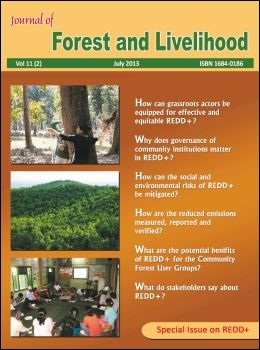Social Safeguards in REDD+: A Review of Existing Initiatives and Challenges
DOI:
https://doi.org/10.3126/jfl.v11i2.8619Keywords:
REDD safeguards, REDD social and environmental standards, SFM principles and criteria, free, prior and informed consent, women’s carbon standard, MRV of REDD safeguardsAbstract
Reducing emissions from deforestation and forest degradation, as well as conservation and enhancement of forest carbon stocks and promoting sustainable management of forests in developing countries (REDD+) has been proposed as an effective mechanism to mitigate the impacts of climate change. However, in view of the significant dependence of the local communities, indigenous peoples, women and other marginalized groups on the forest resources for their livelihoods and other daily needs, a number of apprehensions have been raised, citing the potential risk associated with the faulty design and weak implementation of the REDD+ mechanism. In this context, a number of international initiatives have been proposing different sets of social and environmental safeguards, which can prevent potential social and/or environmental damage or harm to such forest-dependent communities and increase benefits for them in an equitable manner. By presenting brief overviews of various international level social and environmental safeguards, the authors argue that the initiatives taken so far provide a solid basis for formulating them at national level despite several challenges. There is a need to customize and harmonize the safeguard measures proposed so far with the national level initiatives related to forest/land rights, forest governance, benefits sharing, and so on. Ensuring effective and meaningful participation of local communities and civil society has been identified as challenging prerequisite to address genuine concerns of forest managing communities while developing, implementing and monitoring safeguard provisions. Similarly, allowing utmost important factor – flexibility - in the interpretation and implementation of safeguard provisions at the national and local contexts has to be recognized and managed properly.
DOI: http://dx.doi.org/10.3126/jfl.v11i2.8619
Journal of Forestry and Livelihood Vol.11(2) 2013 27-36
Downloads
Downloads
Published
How to Cite
Issue
Section
License
CC-BY-NC: This license allows reusers to distribute, remix, adapt, and build upon the material in any medium or format for noncommercial purposes only, and only so long as attribution is given to the creator.





